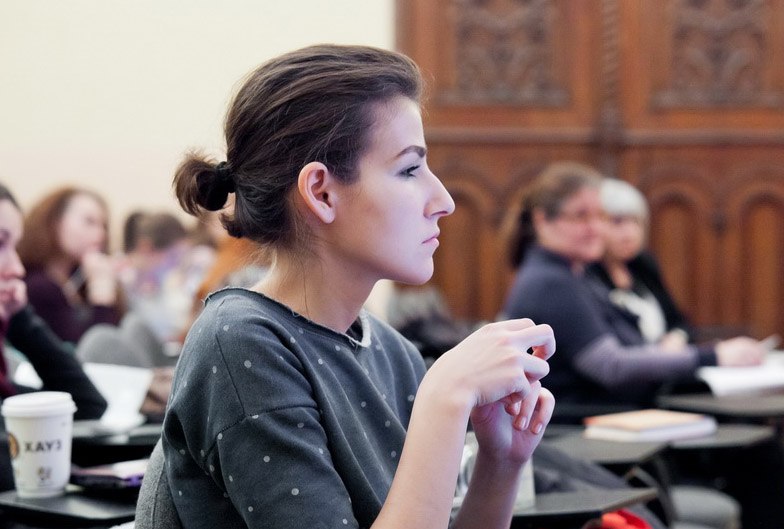Russian and French Scholars Present Research on Soviet History at Graduate Seminar
The International Centre for the History and Sociology of World War II and its Consequences at HSE University held a Graduate Student Seminar in Soviet History together with Sciences Po (France) on June 17 – 18, 2019. HSE News Service spoke with participants and instructors of the seminar, which examinedthe impact of WWII on the Soviet Union and surrounding regions, as well as aspects of the Soviet system from Stalin up to the 1980s.
Intellectual Exchange
‘This was a productive seminar and a meeting of two significant groups of twentieth-century historians, those at Sciences Po in Paris and at HSE's WWII Centre,’ said Michael David-Fox, Academic Supervisor of the International Centre for the History and Sociology of World War II and Its Consequences. ‘Graduate students and post-docs at leading institutions are the ones doing new and original work. At this event, they benefitted from the commentaries of both senior faculty members and their peers, who had all read the papers in advance. Everyone came eager and ready to work, and I think they benefited from seeing an international group of historians take part in critique, discussion, and intellectual exchange.’
Serving alongside Professor David-Fox as a discussant in the seminar was Dr. Nadège Ragaru, a historian and professor at Sciences Po (Paris) who teaches courses on the cultural history of socialism and the history, historiography and memory of the Holocaust in Bulgaria, Macedonia and Greece. ‘I was impressed with the richness of the materials that were presented, the diversity of archival sources the PhD students have been able to gather, the range of their foreign language skills and the breadth of their theoretical knowledge,’ said Dr. Regaru. ‘All participants had invested much time in preparing oral presentations accompanied with PowerPoint visual materials. It was really nice to have brought together a panel of students at different stages in their research, and to see their eagerness to share ideas and dilemmas with their colleagues, as well as explore new research paths.’
Feedback and Constructive Criticism
 Kristina Tanis
Kristina Tanis
Photo courtesy of Kristina Tanis
Kristina Tanis, a research assistant at the International Centre for the History and Sociology of World War II and its Consequences, studies Soviet film history. She is currently writing a dissertation entitled, ‘Trophy Film in the USSR during the 1940s and 1950s: History, Ideology, Reception’, which examines so-called ‘trophy films’, their reception and their place in Soviet cultural diplomacy.
At the seminar, Kristina presented a paper that is based on her dissertation’s second chapter, which examines ‘trophy films’ in the context of the USSR’s cultural policy. The aim of the paper, Kristina says, ‘is to show how the cultural confrontation between the USSR and the USA at the beginning of the Cold War gave rise to the appearance of the well-known subheading, ‘This film was captured as a trophy after the Soviet Army defeated Nazi troops near Berlin in 1945’, which in turn started the phenomenon of “trophy films” in the public sphere. In my paper I also try to show how at the end of the Cold War new cultural and ideological concepts took root, which, in fact, led to the concept of “trophy films”.’
Of particular value, Kristina said, was the opportunity to get feedback from leading scholars in the field. Professors Michael David-Fox and Nadège Ragaru closely read the students’ papers in advance and provided insightful commentary and suggestions.
A Space for Collaboration
The seminar also served as a forum for potential collaboration. ‘Despite the fact that the topics of everyone’s papers varied widely (ranging from venereal diseases during WWII to the trials of those accused of sabotage during the Great Terror of the 1930s), there were a lot of points of intersection,’ said Kristina. ‘We talked about our experiences working in Russian and French archives, and many of us came away from the seminar with plans for future collaboration with colleagues. For example, at my panel Ekaterina Mitiukova did a presentation about Soviet film exportation (‘Soveksportfilm’), and, as it turns out, I also have material on this topic, so we decided that we should collaborate on something internationally in the future.’
The Importance of Historical Analysis
Paul Lenormand, a Ph. D student at Sciences Po, highlighted the importance of critical historical analysis and sharing experiences. ‘I am not sure history offers great lessons about the past—or at least things that we can use firsthand in the present,’ he said. ‘However, it gives a lot of perspective on the long-term, on whatever form of planning, and it destroys illusions about remodeling society from the top without including the people.’
In terms of moving beyond the seminar, Paul noted, ‘The big question now is what can we do from these shared experiences, and can we find people to build new, more collective projects? And where do we find the money and academic support for the advancement of such research?
Looking Forward
Since 2019 marks the 30th anniversary of the end of socialism in Central and Southeastern Europe, Nadège Ragaru said, the fall of 2019 will be a very intense period in terms of conferences and workshops as well as an occasion for historical reflection.
‘How much do we know about the dynamics underpinning these changes? How do today's generations remember those times? To what extent have the 1989 events impacted the ways of doing research about Russia and Сentral Europe?’ Dr. Ragaru said. ‘Most of my students were born after 1989. Socialism for them is associated with the lived experiences of their grandparents, and the childhood memories of their parents. This makes for very complex and interesting intergenerational discussions.’
Michael David-Fox
Academic Supervisor of the International Centre for the History and Sociology of World War II and Its Consequences
Kristina Tanis
Research Assistant at the International Centre for the History and Sociology of World War II and Its Consequences